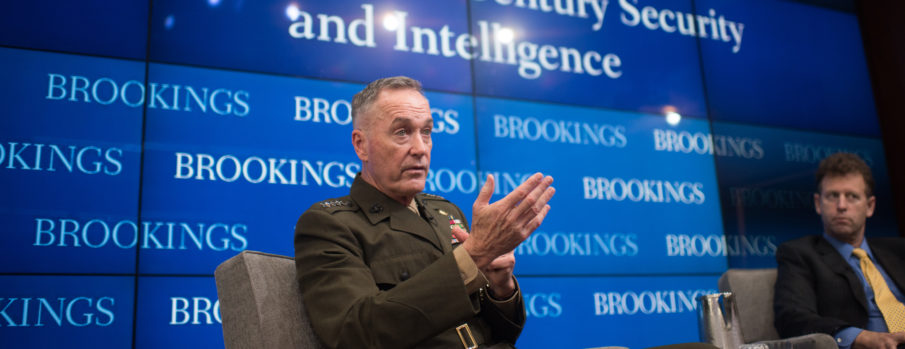General Joseph F. Dunford, chairman of the joint chiefs of staff, addressed a crowd at the Brookings Institute last week, in which he discussed the challenges faced by the American military and how best to face them in the coming years.
The Brookings Institute, a Washington DC based think tank, gave Dunford the opportunity to express his positions on threats like Russia, China, Iran, North Korea, and Islamic Extremism in a fairly informal conversation with Brookings Senior Fellow, Michael O’Hanlon, co-director of the Center for 21st Century Security and Intelligence.
“I can’t imagine any conflict that we would be involved with in the future being narrowly focused in one region. It would have transregional implications right away and then multifunctional [ones],” General Dunford said of the state of modern combat operations throughout the world.
Dunford emphasized that, although the five groups he listed above each represent legitimate threats to the safety and well-being of the United States, a sixth could be added to the list: “solvency.”
“We all recognize that the economic strength of our nation is the foundation that we have to build military capability and advance security,” General Dunford said. “So just speaking about it strictly in a national security context, our capabilities and capacities—that is what we can do and how much we have to do it with—are inextricably linked to the strength of our economy and the stability of the budgets that we have.”
According to Dunford, Russia poses an “existential threat” to the United States, as they have worked to modernize their abilities to use all of their available assets, including information gathering, cyber-attacks, diplomacy, and military action to accomplish their strategic goals.
“What they seek to do in all of that is to undermine the credibility of our ability to meet our alliance commitments to NATO and then [operating against] the cohesion of the NATO alliance would be would be an objective of Russian activity,” he said.
He went on to reiterate his personal support for the NATO alliance, even going so far as to contradict President Trump’s statement regarding NATO along the campaign trail when Dunford said in no uncertain terms that the United States is fully prepared to honor Article 5 of the NATO charter. Article 5 stipulates that all NATO members must come to the aid of one another if attacked, treating an attack on any NATO member as an attack on all NATO states. During his campaign, President Trump suggested that because the majority of NATO member nations have failed to fulfil their financial obligations to the alliance, he may be reluctant to honor Article 5 once elected. General Dunford did, however, echo the President’s concerns about members meeting their financial obligations.
“This is all about transforming NATO to be relevant to meet the security challenges which we confront today,” he added. “A recognition that in order to remain viable, in order to remain credible, in order to deter conflict in Europe, we need to make sure that NATO meets its requirements for defense spending.”
Image courtesy of the Joints Chief of Staff Official Website
Already have an account? Sign In
Two ways to continue to read this article.
Subscribe
$1.99
every 4 weeks
- Unlimited access to all articles
- Support independent journalism
- Ad-free reading experience
Subscribe Now
Recurring Monthly. Cancel Anytime.











COMMENTS